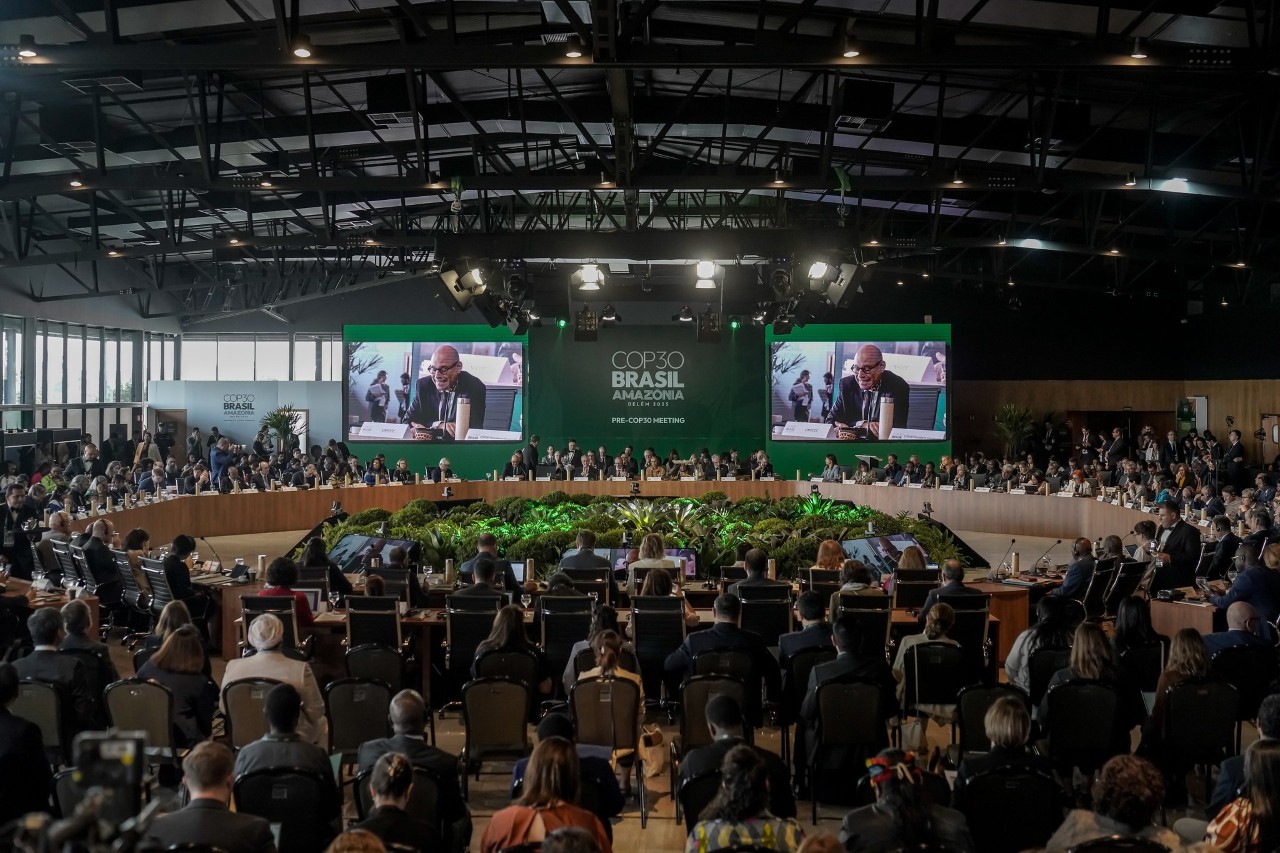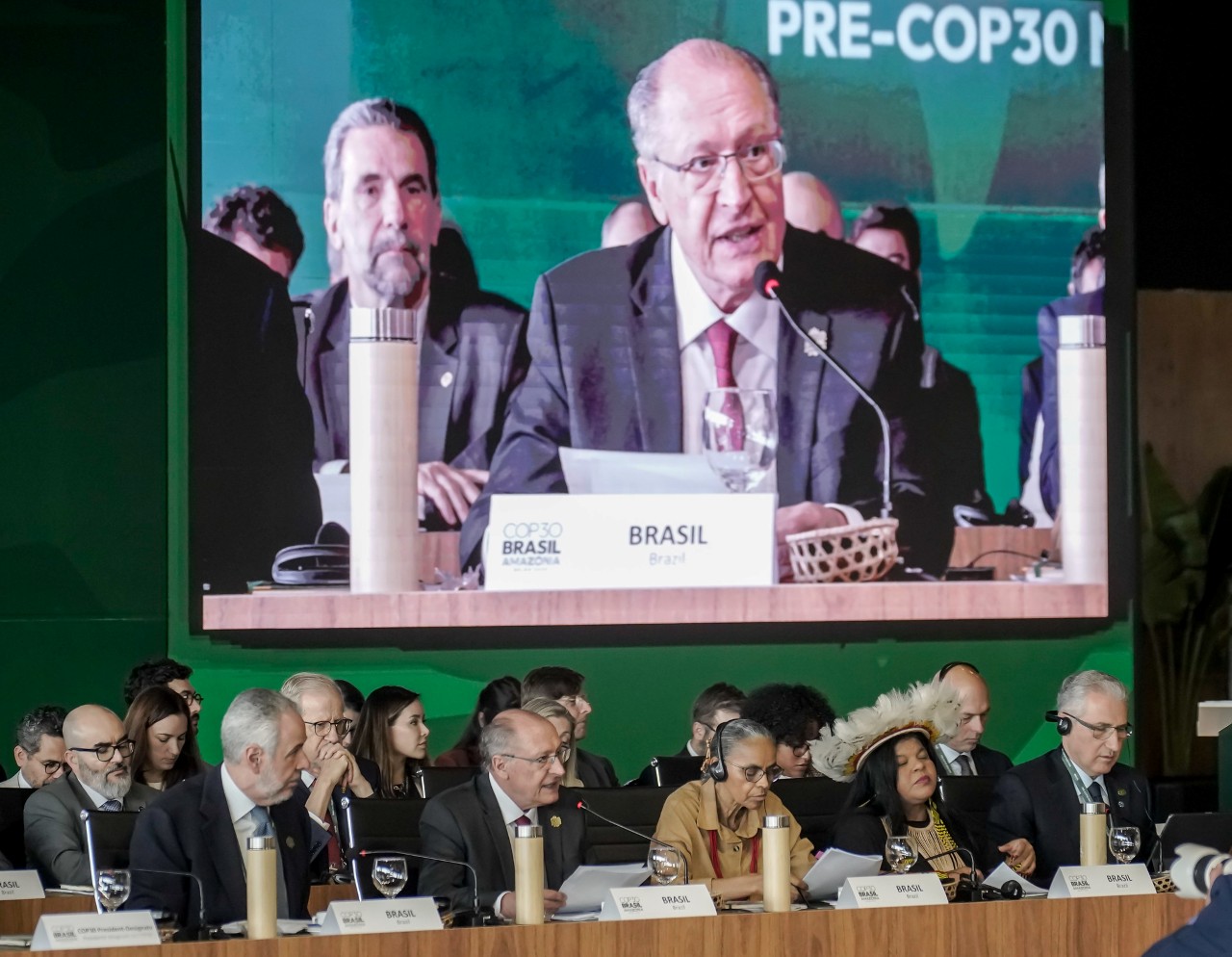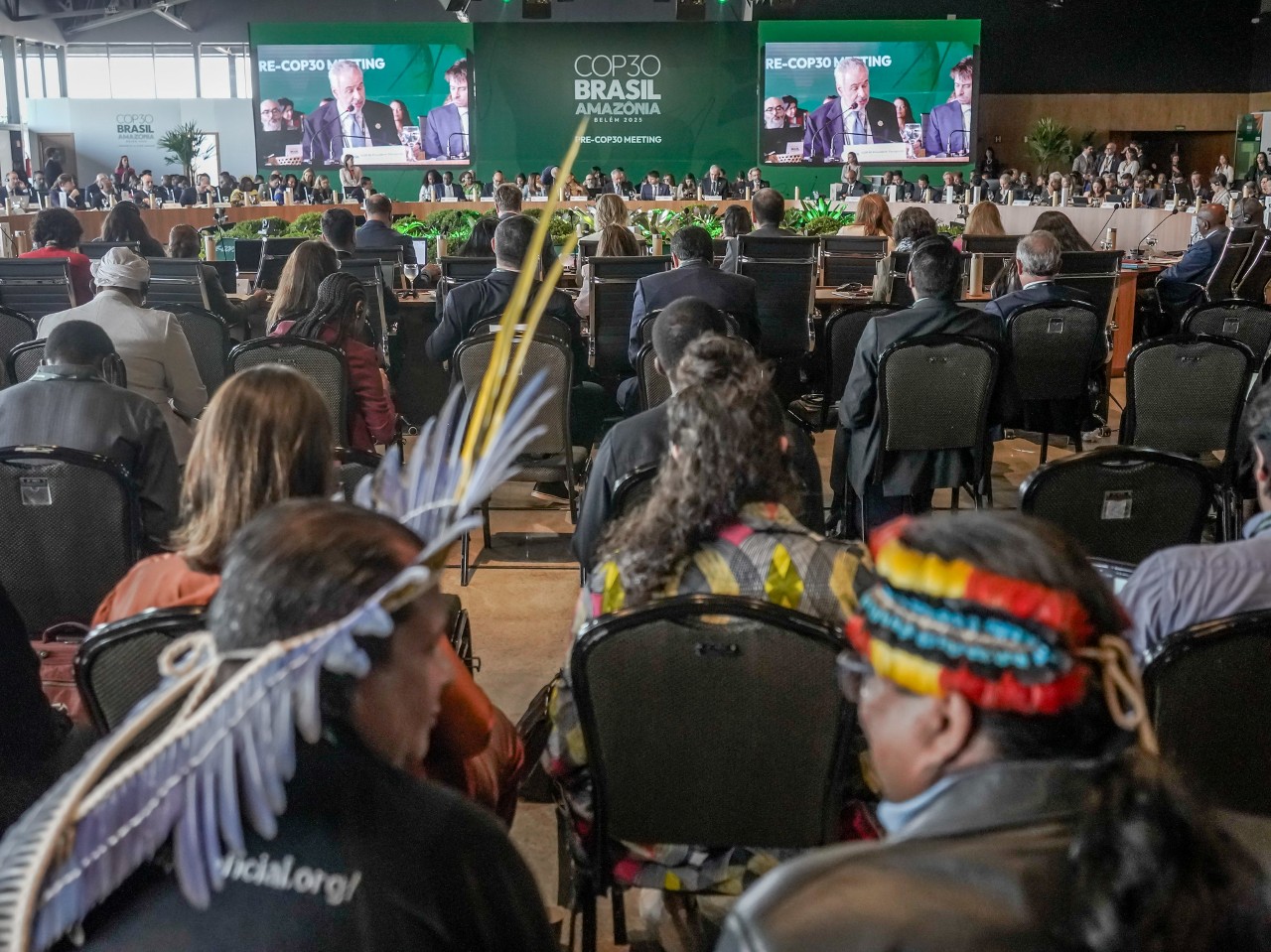Preparatory Negotiations for COP30 Begin with a Focus on Implementing Climate Agreements and Strengthening Multilateralism
The Pre-COP takes place this Monday and Tuesday, 13–14 October, in Brasilia. The opening session highlighted the need to reinforce multilateralism within the global climate agenda and featured the presentation of outcomes from the Presidency Circles initiative

By Mayara Souto / COP30
The Pre-COP began this Monday, 13 October, with a central message emphasizing the advancement of climate agreement implementation as a pathway to strengthening multilateralism. The opening session was attended by the Acting President of the Federative Republic of Brazil, Geraldo Alckmin; the Executive Secretary of the United Nations Framework Convention on Climate Change (UNFCCC), Simon Stiell; and representatives of the COP30 Presidency Circles.
Alckmin opened the session by outlining the pillars that will guide negotiations at the Conference in Belém. “The Brazilian Presidency of COP30 has proposed three central objectives: first, to strengthen multilateralism and the climate change regime within the framework of the United Nations Convention; second, to connect the climate regime to people’s real lives; and third, to accelerate the implementation of the Paris Agreement by promoting efforts and structural adjustments across all institutions capable of contributing to this endeavor,” stated the Brazilian Minister of Development, Industry, Trade and Services.
“I believe this collective effort of cooperation among nations must be channeled into the COP negotiations and focused on countries’ Nationally Determined Contributions (NDCs) under the Paris Agreement. The submission of NDCs aligned with the 1.5°C target by governments is a decisive signal of their commitment to combating climate change and strengthening multilateralism,” he added.

New NDCs
Acting President Alckmin reaffirmed Brazil’s commitment to leading by example, recalling that the country’s NDC 3.0 was presented at COP29 in Baku. The updated contribution sets a target to reduce net greenhouse gas emissions by 59% to 67% by 2035, compared to 2005 levels—equivalent to a reduction of 850 million to 1.5 billion tonnes of CO₂ in the atmosphere.
This new NDC from Brazil reflects the vision of a country that recognizes the climate crisis, embraces the urgency of building resilience, and charts a pathway toward a low-carbon future for society, the economy, and its ecosystems,” Alckmin stated.
UNFCCC Executive Secretary Simon Stiell recalled that a report assessing the ambition of countries’ NDCs will be released this month by the UNFCCC, along with two additional documents—one on transparency and another on National Adaptation Plans (NAPs). “I encourage Parties that have not yet submitted their new NDCs to do so ahead of COP30, so that delegates can have a more comprehensive view as they carry out their crucial work in Belém,” he remarked.
Energy Transition
Acting President Geraldo Alckmin also underscored the advanced stage of Brazil’s energy transition. While 69 countries generate 50% of their electricity from renewable sources, Brazil has already surpassed the 80% mark.
“This is a bold yet realistic emissions reduction plan that envisions economic growth alongside energy transition and forest protection—reflecting our commitment to sustainable development. We are proof that the energy transition is both feasible and profitable. We are committed—and we expect the same commitment from the international community,” Alckmin stated.
UNFCCC Executive Secretary Simon Stiell echoed the importance of the energy transition, noting its increasing alignment with global economic trends. “The real economy is increasingly converging with the goals of the Paris Agreement, albeit unevenly. Last year, global investment in clean energy exceeded US$2 trillion. Nearly 90% of newly added power generation capacity was renewable, driven by momentum in major economies. Yet substantial efforts are still required to ensure that the vast economic and human benefits of the energy transition are shared equitably among nations,” he emphasized.
Expectations
Executive Secretary Stiell outlined the critical outcomes required from COP30 to ensure the success of global climate negotiations. He emphasized the need for Parties to “respond clearly and decisively to the latest scientific findings and data, which indicate both the progress achieved and the areas where urgent acceleration is required.” He further underscored the importance of demonstrating that “climate multilateralism continues to deliver, with robust outcomes across all negotiation tracks.”
To this end, the Executive Secretary reaffirmed the urgency of “faster and broader implementation across all sectors and economies, leaving no one behind.” In this context, he stressed that climate action must “connect more directly with real lives everywhere”—demonstrating tangible impacts such as better jobs, higher living standards, clean air, healthy lives, food security, and other key dimensions of human well-being.
“Brazil arrives at COP as a country that believes ethics, innovation, and sustainability are not parallel paths, but one and the same—the path of shared responsibility for the common future of humanity,” stated Alckmin.
COP29 President Mukhtar Babayev, Minister of Ecology and Natural Resources of Azerbaijan, expressed support for the COP30 Presidency, led by Ambassador André Corrêa do Lago.
“The incoming Presidency has provided us with a very clear direction: we must focus on a just transition programme and fully implement the outcomes of the Global Stocktake (GST). These two workstreams should send a strong signal towards a new financial mechanism,” he said, adding that the Baku–Belém Roadmap is currently under development, outlining how to mobilize the proposed US$1.3 trillion in climate finance for developing countries.
Stocktake of the Circles
Following the official opening, the leaders of each of the four COP30 Presidency Circles presented a progress review of actions undertaken to date. These Circles are thematic working groups established to mobilize public, private, community, and international stakeholders in coordinating concrete climate-related initiatives across key sectors.
Brazil’s Minister of Finance, Fernando Haddad, leads the Finance Circle, which is responsible for consolidating inputs for the Baku–Belém Roadmap. “Throughout the year, we have worked on developing three strategic pillars for the COP30 Agenda: the Forests Forever Fund (TFFF), which proposes a new financing model based on investment rather than solely on donations; the Open Coalition for Carbon Market Integration, aimed at harmonizing and ensuring interoperability among regulated markets; and the Supertaxonomy, designed to guarantee comparability and integrity across national taxonomies, thereby guiding sustainable investments,” he summarized.
In the Presidents’ Circle, Laurent Fabius—President of COP21 in Paris—shared a video message emphasizing that countries continue to advance actions aligned with the Paris Agreement. “It is essential that we focus our efforts during the Pre-COP and COP not on creating new goals, but on implementing those already established,” he affirmed.

Sônia Guajajara, Brazil’s Minister of Indigenous Peoples, presented the progress report of the Peoples’ Circle. “We will have the largest and most meaningful COP in history in terms of Indigenous participation, with the largest accredited delegation in the Blue Zone,” she stated. “I invite us all, at this COP, to also bring forward solutions that recognize territories as carbon sinks and incorporate the lived realities of Indigenous peoples and local communities.”
Concluding the session, Minister of the Environment and Climate Change, Marina Silva, represented the Global Ethical Stocktake Circle. The group is co-led by the President of Brazil, Luiz Inácio Lula da Silva, and the Secretary-General of the United Nations, António Guterres. The Circle draws inspiration from the Global Stocktake under the Paris Agreement.
Minister Silva emphasized the centrality of ethics in global climate governance: “Ethics is what gives meaning to action. It reminds us that confronting the climate emergency also means confronting a moral and civilizational crisis. The Global Ethical Stocktake proposes a space for listening to global society, focusing on the intersection between political decision-making and the urgency of implementation through an ethical lens,” she observed. She noted that six EGB dialogues were held this year, one in each region of the world.
“May COP30 become a collective effort to implement the agreements reached thus far. May the EGB and the other COP30 mobilization circles contribute to making this Conference a historic turning point—a foundational reference that helped prevent the points of no return, both for the climate and for climate multilateralism,” Minister Silva concluded.
Translation: Michel Emmanuel Félix François (POET/UFC)
Proofreading: Tadeu Azevedo (POET/UFC)
